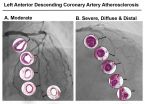Even very small brain lesions increase risk for death
News from Annals of Internal Medicine July 7, 2015
2015-07-07
(Press-News.org) 1. For patients with no history of stroke, even very small brain lesions increase risk for death
Free abstract: http://www.annals.org/article.aspx?doi=10.7326/M14-2057
URL goes live when embargo lifts
For asymptomatic patients with no history of clinical stroke, having even very small brain lesions (less than 3 mm) detected by magnetic resonance imaging (MRI) triples their risk for stroke and death, according to a study published in Annals of Internal Medicine. Having both very small and larger lesions increases the risk to eight-fold.
Subclinical brain infarctions are typically defined as lesions 3 mm or larger on imaging in patients without a history of stroke. These lesions have been associated with an increased stroke and death, particularly in older patients. The clinical significance of smaller lesions has not been explored.
Researchers examined MRI data for a large cohort of patients from two Atherosclerosis Risk in Communities (ARIC) Study sites to determine the association between lesion size and incident stroke, stroke-related mortality, and all-cause mortality. They found that having very small lesions only or having lesions 3 mm or larger only was associated with increased risk for stroke and death in middle-aged and older patients. Having both types of lesions at the same time was associated with a particularly striking risk increase. The authors conclude that clinicians may want to reconsider the practice of dismissing very small cerebral lesions found on MRI.
Notes: For an embargoed PDF, please contact Angela Collom or Cara Graeff. To reach the lead author, Dr. B. Gwen Windham, please contact Dustin Barnes at dlbarnes@umc.edu or 601-984-1970.
2. Coronary artery calcification scans could help to identify patients at risk for premature death
Free abstract: http://www.annals.org/article.aspx?doi=10.7326/M14-0612
URLs go live when embargo lifts
Physicians can use coronary artery calcification (CAC) scores to accurately predict 15-year mortality in asymptomatic patients, according to a study published in Annals of Internal Medicine. Previous reports on the prognostic value of CAC scores have had a limited duration of follow-up.
CAC scores have been used to estimate cardiovascular prognosis and all-cause mortality in the short term. Researchers collected CAC scores and binary risk factor data for a large cohort of asymptomatic patients at a single-center, outpatient cardiology laboratory to determine the ability of CAC scores to predict long-term mortality. They found that the score accurately predicted all-cause mortality up to 15 years in asymptomatic patients. The authors suggest that CAC scanning could help to identify patients at risk for premature death. Patients with high scores could be advised to adopt healthier lifestyles, which could lead to better outcomes.
Notes: For an embargoed PDF, please contact Angela Collom or Cara Graeff. To speak with the lead author, Dr. Leslee Shaw, please contact Holly Korschum at hkorsch@emory.edu or 404-727-3990.
INFORMATION:
ELSE PRESS RELEASES FROM THIS DATE:
2015-07-07
Scientists with the University of Mississippi Medical Center (UMMC) and colleagues found that very small brain lesions noted on brain imaging that would typically be disregarded by clinicians are associated with a heightened risk of stroke and death. The findings are in today's (July 7, 2015) Annals of Internal Medicine.
The discovery about these tiny lesions -- areas of the brain where tissue may have been damaged by injury or disease -- may help physicians identify people at risk of stroke and death as early as middle age, even when they are displaying no symptoms of ...
2015-07-07
A study in the online edition of Annals of Internal Medicine suggests that coronary artery calcification (CAC) scans could help physicians identify patients at risk for premature death.
According to the National Institutes of Health, a CAC is an x-ray test that looks for specks of calcium in the walls of the coronary arteries. These specks of calcium are called calcifications and are an early sign of coronary artery disease.
Researchers from Emory University School of Medicine, led by Leslee Shaw, PhD, professor of cardiology, collected and assessed CAC scores and ...
2015-07-06
In a first-of-its-kind study, researchers have investigated the impact of different walking aids on patients with chronic obstructive disease (COPD).
Walking with the help of a rollator (a frame with wheels, handlebars, and a built-in seat) resulted in the longest distance walked and most time spent walking. The use of walking with assistance of a draisine (a bicycle without pedals) improved walking speed with fewer strides but did not improve the time spent walking by COPD patients to cover a longer distance. "Patients with COPD walked significantly further and longer ...
2015-07-06
In a study of 1159 males who illicitly used amphetamines, half of participants said drug use had no impact on their sexual functions, while the other half reported impacts such as reduced erectile rigidity and sexual satisfaction, enhanced orgasmic intensity, and delayed ejaculation.
"Compared with 211 matched controls, amphetamine users were twice as likely to experience erectile dysfunction," said Dr. Bang-Ping Jiann, senior author of The Journal of Sexual Medicine study.
Amphetamines are a group of drugs that stimulate the central nervous system and contain ingredients ...
2015-07-06
Researchers have long had reason to hope that blocking the flow of calcium into the mitochondria of heart and brain cells could be one way to prevent damage caused by heart attacks and strokes. But in a study of mice engineered to lack a key calcium channel in their heart cells, Johns Hopkins scientists appear to have cast a shadow of doubt on that theory. A report on their study is published online this week in Proceedings of the National Academy of Sciences.
"We confirmed that this calcium channel is important for heart function," says senior investigator Mark Anderson, ...
2015-07-06
July 6, 2015 CHAPEL HILL, NC - Insulin resistance affects tens of millions of Americans and is a big risk factor for heart disease. Yet, some people with the condition never develop heart disease, while some experience moderate coronary blockages. Others, though, get severe atherosclerosis - multiple blockages and deterioration of coronary arteries characterized by thick, hard, plaque-ridden arterial walls. Researchers at the UNC School of Medicine created a first-of-its-kind animal model to pinpoint two biomarkers that are elevated in the most severe form of coronary disease.
The ...
2015-07-06
Researchers have found several key differences among people who receive hospice care--which maintains or improves the quality of life for someone whose condition is unlikely to be cured--in assisted-living facilities (ALFs) compared with people who receive hospice care at home.
People receiving hospice care in ALFs were more likely to be older and female than people who received hospice care at home. Also, people living in ALFs enrolled in hospice care much earlier than patients living in home settings. This allowed them to receive more help from the hospice team before ...
2015-07-06
Lyme disease is currently estimated to affect 300,000 people in the U.S. every year, and blacklegged ticks, the disease's main vector, have recently flourished in areas previously thought to be devoid of this arachnid.
A new study finds that the newly detected tick populations likely arose mainly from southern populations that migrated to nearby northern locations.
"The fine temporal and spatial scale of the samples analyzed allowed for precise estimates of the rate, timing, and direction of individual migratory events," said Dr. Camilo Khatchikian, lead author of the ...
2015-07-06
DURHAM, N.C. -- Looking around at a 20th high school reunion, you might notice something puzzling about your classmates. Although they were all born within months of each other, these 38-year-olds appear to be aging at different rates.
Indeed they are, say the leaders of a large long-term human health study in New Zealand that has sought clues to the aging process in young adults.
In a paper appearing the week of July 6 in the Proceedings of the National Academy of Sciences, the team from the U.S., UK, Israel and New Zealand introduces a panel of 18 biological measures ...
2015-07-06
Madison, Wis. -- In rhesus monkey families - just as in their human cousins - anxious parents are more likely to have anxious offspring.
And a new study in an extended family of monkeys provides important insights into how the risk of developing anxiety and depression is passed from parents to children.
The study from the Department of Psychiatry and the Health Emotions Research Institute at the University of Wisconsin-Madison shows how an over-active brain circuit involving three brain areas inherited from generation to generation may set the stage for developing ...
LAST 30 PRESS RELEASES:
[Press-News.org] Even very small brain lesions increase risk for death
News from Annals of Internal Medicine July 7, 2015

